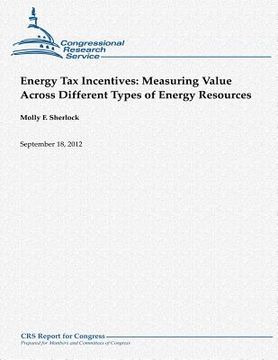Energy Tax Incentives: Measuring Value Across Different Types of Energy Resources (en Inglés)
Reseña del libro "Energy Tax Incentives: Measuring Value Across Different Types of Energy Resources (en Inglés)"
The majority of energy produced in the United States is derived from fossil fuels. In recent years, however, revenue losses associated with tax incentives that benefit renewables have exceeded revenue losses associated with tax incentives benefitting fossil fuels. As Congress evaluates the tax code and various energy tax incentives, there has been interest in understanding how energy tax benefits under the current tax system are distributed across different domestic energy resources. In 2010, fossil fuels accounted for 78.0% of U.S. primary energy production. The remaining primary energy production is attributable to nuclear electric and renewable energy resources, with shares of 11.2% and 10.7%, respectively. Primary energy production using renewable energy resources includes both electricity generated using renewable resources, including hydropower, as well as renewable fuels (e.g., biofuels). The value of federal tax support for the energy sector was estimated to be $19.1 billion in 2010. Of this, roughly one-third ($6.3 billion) was for tax incentives that support renewable fuels. Another $6.7 billion can be attributed to tax-related incentives supporting various renewable energy technologies (e.g., wind and solar). Targeted tax incentives supporting fossil energy resources totaled $2.4 billion. This report provides an analysis of the value of energy tax incentives relative to primary energy production levels. Relative to their share in overall energy production, renewables receive more federal financial support through the tax code than energy produced using fossil energy resources. Within the renewable energy sector, relative to the level of energy produced, biofuels receive the most tax-related financial support. The report also summarizes the results of recently published studies by the Energy Information Administration (EIA) evaluating energy subsidies across various technologies. According to data presented in the EIA reports, the share of direct federal financial support for electricity produced using coal, natural gas and petroleum, and nuclear energy resources was similar in 2007 and 2010. Between 2007 and 2010, however, the share of federal financial support for electricity produced by renewables increased substantially, and federal financial support for refined coal disappeared. Projections of the annual cost of energy-related tax provisions through 2015 show that, under current law, tax-related support for renewable fuels will effectively disappear after 2012. The amount of tax-related support for renewable electricity is also scheduled to decline over time given the recent expiration of the Section 1603 grants in lieu of tax credits program and the scheduled expiration of other tax incentives for renewable electricity, such as the production tax credit (PTC). The value of energy-related tax provisions that benefit fossil fuels is projected to remain relatively constant over time, under current law, as most provisions that benefit fossil fuels are permanent Internal Revenue Code (IRC) provisions.

